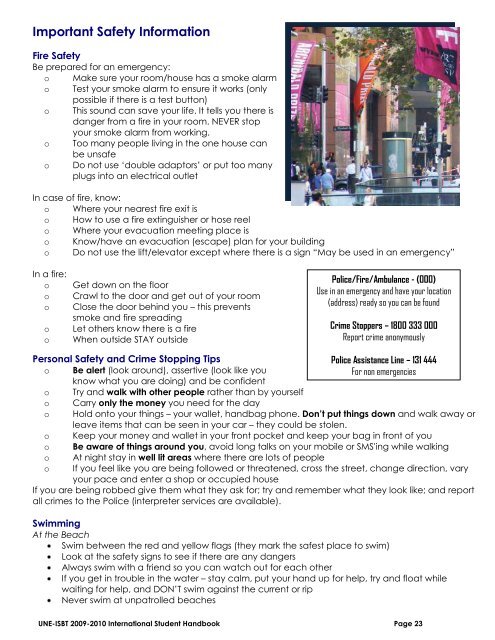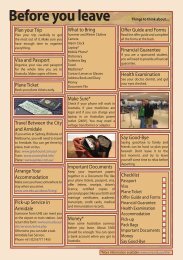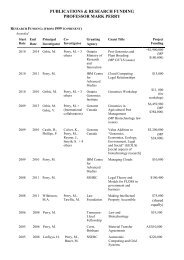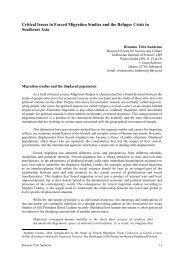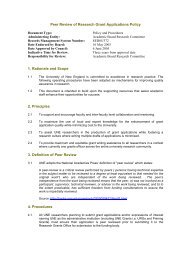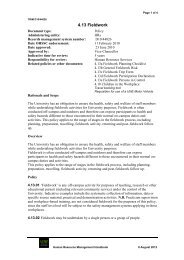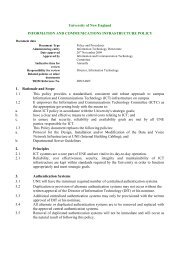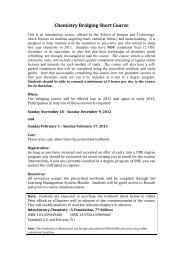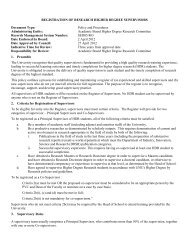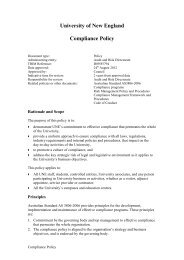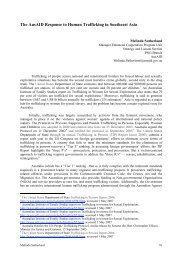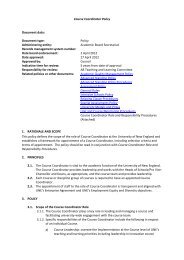International Student Handbook - University of New England
International Student Handbook - University of New England
International Student Handbook - University of New England
Create successful ePaper yourself
Turn your PDF publications into a flip-book with our unique Google optimized e-Paper software.
Important Safety Information<br />
Fire Safety<br />
Be prepared for an emergency:<br />
o Make sure your room/house has a smoke alarm<br />
o Test your smoke alarm to ensure it works (only<br />
possible if there is a test button)<br />
o This sound can save your life. It tells you there is<br />
danger from a fire in your room. NEVER stop<br />
your smoke alarm from working.<br />
o Too many people living in the one house can<br />
be unsafe<br />
o Do not use „double adaptors‟ or put too many<br />
plugs into an electrical outlet<br />
In case <strong>of</strong> fire, know:<br />
o Where your nearest fire exit is<br />
o How to use a fire extinguisher or hose reel<br />
o Where your evacuation meeting place is<br />
o Know/have an evacuation (escape) plan for your building<br />
o Do not use the lift/elevator except where there is a sign “May be used in an emergency”<br />
In a fire:<br />
o<br />
o<br />
o<br />
o<br />
o<br />
Get down on the floor<br />
Crawl to the door and get out <strong>of</strong> your room<br />
Close the door behind you – this prevents<br />
smoke and fire spreading<br />
Let others know there is a fire<br />
When outside STAY outside<br />
Police/Fire/Ambulance - (000)<br />
Use in an emergency and have your location<br />
(address) ready so you can be found<br />
Crime Stoppers – 1800 333 000<br />
Report crime anonymously<br />
Personal Safety and Crime Stopping Tips<br />
Police Assistance Line – 131 444<br />
o Be alert (look around), assertive (look like you<br />
know what you are doing) and be confident<br />
For non emergencies<br />
o Try and walk with other people rather than by yourself<br />
o Carry only the money you need for the day<br />
o Hold onto your things – your wallet, handbag phone. Don’t put things down and walk away or<br />
leave items that can be seen in your car – they could be stolen.<br />
o Keep your money and wallet in your front pocket and keep your bag in front <strong>of</strong> you<br />
o Be aware <strong>of</strong> things around you, avoid long talks on your mobile or SMS'ing while walking<br />
o At night stay in well lit areas where there are lots <strong>of</strong> people<br />
o If you feel like you are being followed or threatened, cross the street, change direction, vary<br />
your pace and enter a shop or occupied house<br />
If you are being robbed give them what they ask for; try and remember what they look like; and report<br />
all crimes to the Police (interpreter services are available).<br />
Swimming<br />
At the Beach<br />
Swim between the red and yellow flags (they mark the safest place to swim)<br />
Look at the safety signs to see if there are any dangers<br />
Always swim with a friend so you can watch out for each other<br />
If you get in trouble in the water – stay calm, put your hand up for help, try and float while<br />
waiting for help, and DON‟T swim against the current or rip<br />
Never swim at unpatrolled beaches<br />
UNE-ISBT 2009-2010 <strong>International</strong> <strong>Student</strong> <strong>Handbook</strong> Page 23


